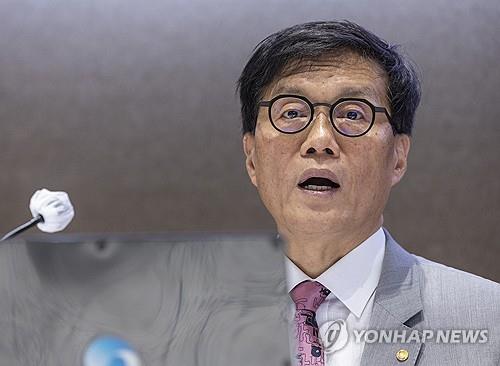- California Assembly OKs highest minimum wage in nation
- S. Korea unveils first graphic cigarette warnings
- US joins with South Korea, Japan in bid to deter North Korea
- LPGA golfer Chun In-gee finally back in action
- S. Korea won’t be top seed in final World Cup qualification round
- US men’s soccer misses 2nd straight Olympics
- US back on track in qualifying with 4-0 win over Guatemala
- High-intensity workout injuries spawn cottage industry
- CDC expands range of Zika mosquitoes into parts of Northeast
- Who knew? ‘The Walking Dead’ is helping families connect
U.S. tariff impact bigger policy concern than inflation for S. Korea: BOK chief
The South Korean bank chief has said that the potential impact of the United States’ new tariff policy on economic growth remains a major challenge, and the central bank is assessing how to proceed with interest rate cuts while maintaining financial stability.
The Bank of Korea (BOK) Gov. Rhee Chang-yong made the remarks during a panel discussion at the European Central Bank’s annual forum in Sintra, Portugal, on Tuesday (local time), according to its officials.

“About the tariff’s impact on inflation, our current inflation is well stabilized at around 2 percent, and we believe tariffs tend to be deflationary rather than inflationary,” Rhee said, noting that South Korea is unlikely to use retaliatory tariffs and China’s export costs have been on a decline.
“At this moment, our growth rate is at 0.8 percent, which is well below our potential growth rate. So our problem is not inflation itself, but the gross impact of tariffs,” he added.
Negotiations are under way over U.S. President Donald Trump’s administration’s aggressive tariff policy after Trump suspended the imposition of 25 percent reciprocal duties on South Korea in April, allowing time for talks until the July 8 deadline.
In May, the BOK sharply lowered its forecast for the country’s economic growth this year to 0.8 percent from its previous projection of 1.5 percent, citing weak consumption and slowing export growth amid uncertainties driven by Washington’s tariff measures.
“We will continue to be in an easing cycle given our growth rate. But recently the financial stability risk has been rising, especially in regard to housing prices in metropolitan areas increasing very fast. So we are keeping an eye on this financial stability risk in deciding the pace and the timing of further cuts,” Rhee added.
The BOK began its monetary easing cycle in October, marking its first policy shift since August 2021, and has cut its benchmark interest rate four times by a total of 1 percentage point through May.
The BOK is scheduled to hold its next rate-setting meeting July 10.












